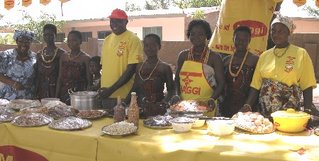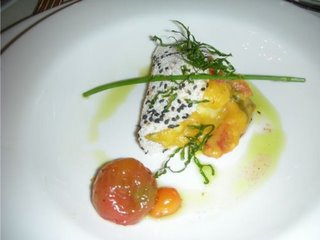East and West African Food and Foodways

African food historians and scholars who are based in Africa can lead lonely lives. They need contact with and support of like-minded people. We need them to share their insights and publish their findings. I recently heard from Forka Leypey Mathew, in Yaounde, Cameroon, who has studied the social history of how traditional food preparation and eating patterns have changed among several groups in Cameroon, including the Bakweri (occupants of Buea and Limbe), Mbo (occupants of Melong, Santchou, Nkongsamba and other villages), Bamum (occupants of Foumban), Wawa (occupants of Banyo), Doowaayo (occupants of Poli), Guidar (occupants of Guider) and Kotoko (occupants of Kousseri and the entire Cameroon section of the Lake Chad Basin). Matew (fleypeymathew@yahoo.fr) welcomes correspondence with others who share similar interests.
Scholars outside of Africa are also doing exciting things. In 2006, Verena Raschke completed her doctoral work cojointly at the University of Vienna in Austria and Monash University in Australia, studying traditional East African food habits and their health benefits, and has made quite a bit of information available online. She's also been actively publishing the results of her research. For example:
1. Raschke V, Cheema B. Colonization, the New World Order and the Eradication of Traditional Food Habits in East Africa: Historical Perspective on the Nutrition Transition. Public Health Nutrition, in press, 2007
2. Raschke V, Oltersdorf U, Elmadfa I, Wahlqvist M, Cheema B, Kouris-Blazos A. Investigation of the Dietary Intake and Health Status in East Africa in the 1960s: A Systematic Review of the Historic Oltersdorf Collection. Ecology of Food and Nutrition, in press, 2007
3. Raschke V, Oltersdorf U, Elmadfa I, Wahlqvist M, Cheema B, Kouris-Blazos A. Content of a novel online collection of traditional east African food habits (1930s-1960s): Data collected by the Max-Planck-Nutrition Research Unit, Bumbuli, Tanzania. Asia-Pacific Journal of Clinical Nutrition, 16:140-51, 2007
4. Raschke V, Oltersdorf U, Elmadfa I, Wahlqvist M, Cheema B, Kouris-Blazos A. The need for an online collection of traditional African food habits. African Journal of Food, Agriculture, Nutrition and Development (AJFAND Online), 7(1), 2007; Available at: http://www.ajfand.net/Issue-XII-files/PDFs/VERENA_2330.pdf
5. Raschke V, East African Food Habits On-line. In: Wahlqvist ML. Healthy Eating Club. Melbourne, HEC Press. Web-site: http://www.healthyeatingclub.org/Africa/; 2005
Let's continue to identify and promote those who take African cuisine and food history seriously!
Labels: African food history, cameroon, Forka Leypey Mathew, Verena Raschke


